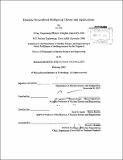Discrete generalized multigroup theory and applications
Author(s)
Zhu, Lei, Ph. D. Massachusetts Institute of Technology
DownloadFull printable version (12.82Mb)
Other Contributors
Massachusetts Institute of Technology. Dept. of Nuclear Science and Engineering.
Advisor
Benoit Forget.
Terms of use
Metadata
Show full item recordAbstract
This study develops a fundamentally new discrete generalized multigroup energy expansion theory for the linear Boltzmann transport equation. Discrete orthogonal polynomials are used, in conjunction with the traditional multigroup representation, to expand the energy dependence of the angular flux into a set of flux moments. The leading (zeroth) order equation is identical to a standard coarse group solution, while the higher order equations are decoupled from each other and only depend on the leading order solution due to the orthogonality property of the discrete Legendre polynomials selected. This decoupling leads to computational times comparable to the coarse group calculation but provides an accurate fine group energy spectrum. A source update process is also introduced which provides improvement of integral quantities such as eigenvalue and reaction rates over the coarse group solution. An online energy recondensation methodology is proposed to improve traditional multilevel approach in reactor core simulations. Since the discrete generalized multigroup (DGM) method produces an unfolded flux with a fine group structure, this flux can then be used to recondense the coarse group cross-sections using the obtained core level fine group DGM solution, which can be done iteratively. Computational tests on light water reactors and high temperature reactors are performed. Results indicate that flux can fully converge to the fine group solution with a computational time less than that of standard fine group calculation as long as a flat angular flux approximation is used spatially. The recondensation concept is extended to a nonlinear energy acceleration form. The method can effectively accelerate the fine group calculation by providing a more accurate initial guess provided from a few iterations of DGM recondensation calculation. Computational results show that the computational time and number of transport sweeps of the accelerated algorithm are much less than those of corresponding standard fine group calculations.
Description
Thesis (Ph. D.)--Massachusetts Institute of Technology, Dept. of Nuclear Science and Engineering, 2012. Cataloged from PDF version of thesis. "February 2012." Includes bibliographical references (p. 179-184).
Date issued
2012Department
Massachusetts Institute of Technology. Department of Nuclear Science and EngineeringPublisher
Massachusetts Institute of Technology
Keywords
Nuclear Science and Engineering.